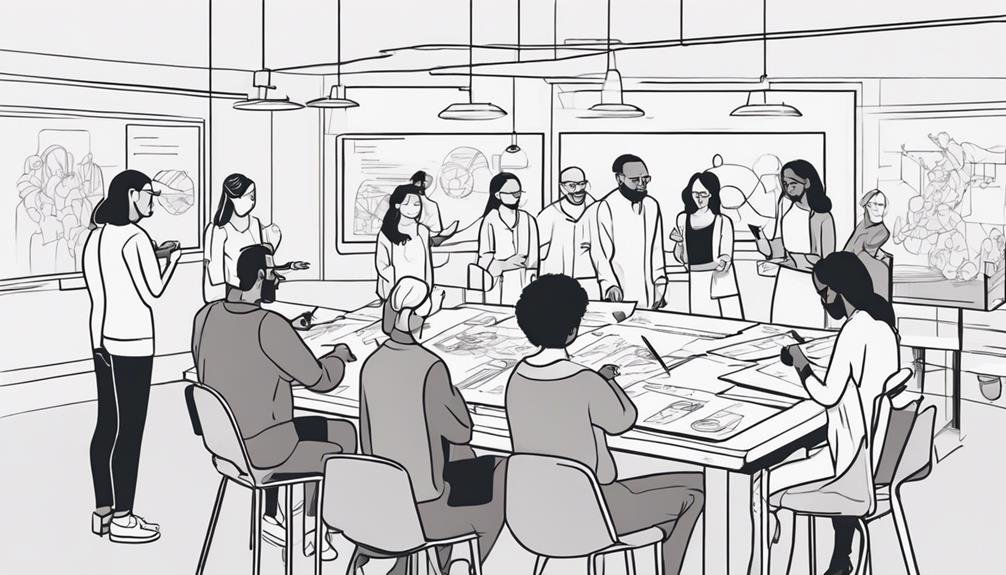To learn new skills effectively, set clear goals, embrace growth mindset, engage in active learning, explore diverse mediums, seek mentorship, practice deliberately, and take strategic breaks. Start by establishing specific learning objectives using SMART criteria, tracking progress, and celebrating achievements to boost success. Believe in your potential for growth, learn from setbacks, and stay motivated. Get hands-on through practical applications, group discussions, and real-world simulations to enhance your critical thinking and collaboration skills. Explore online courses, videos, and podcasts tailored to your learning style. Seek guidance from experienced individuals, practice deliberately, and remember to take strategic breaks for best productivity and skill development.
Key Takeaways
- Set clear, SMART learning goals for success tracking.
- Embrace a growth mindset to view setbacks as learning opportunities.
- Utilize active learning methods like hands-on practice and group discussions.
- Explore various learning mediums such as online courses and podcasts.
- Seek guidance from experienced individuals for personalized feedback and mentorship.
Setting Clear Learning Goals

When starting on the journey to learn new skills, one of the foundational steps is setting clear learning goals. By setting specific, measurable, achievable, relevant, and time-bound (SMART) criteria, you provide yourself with a roadmap for skill acquisition. Clear learning goals can help you stay focused and motivated throughout the learning process. They enable you to track your progress, adjust your learning strategies as needed, and celebrate milestones achieved. Research indicates that individuals who set clear goals are more likely to succeed in learning new skills compared to those without specific objectives. Effective goal-setting enhances motivation, commitment, and overall learning outcomes, leading to greater skill mastery and personal growth. So, take the time to define your learning goals using the SMART criteria, and watch how it propels you towards acquiring new skills with confidence and determination. Your journey to skill acquisition begins with setting clear goals that inspire and drive you forward.
Embracing a Growth Mindset
Embracing a growth mindset is all about believing in your ability to improve through effort and perseverance. This positive outlook can lead to increased resilience, motivation, and a willingness to tackle new challenges head-on. Remember, viewing setbacks as opportunities for learning and growth can pave the way for greater success in various aspects of your life.
Positive Mindset Benefits
Embracing a growth mindset can pave the way for a multitude of positive outcomes in your journey of acquiring new skills. By adopting this perspective, you open yourself up to increased resilience, motivation, and a readiness to face challenges head-on. Viewing setbacks as opportunities for learning and growth becomes second nature, propelling you forward in your skill development. Research underscores that a growth mindset correlates with higher achievement and success across various areas. Those with this mindset are more inclined to persist in the face of obstacles, leading to enhanced performance, creativity, and overall well-being.
| Benefits of Embracing a Growth Mindset | |
|---|---|
| Increased resilience | Willingness to take on challenges |
| Enhanced motivation | Viewing setbacks as learning opportunities |
| Higher achievement and success | Persistence in the face of obstacles |
Adopting a growth mindset not only fuels your skill acquisition journey but also sets the stage for personal growth and achievement in all aspects of life.
Growth Over Fixed
To truly excel in your journey of acquiring new skills, it is important to prioritize growth over fixed mindsets. Embracing a growth mindset means focusing on effort and improvement rather than innate abilities. By being open to learning and viewing challenges as opportunities for growth, you set yourself on a path towards skill mastery. Individuals with a growth mindset are more resilient, motivated, and willing to put in the effort needed to improve.
Research shows that embracing a growth mindset leads to increased achievement and success in various areas of your life. When faced with obstacles, those with a growth mindset persevere and see setbacks as opportunities to learn and grow. By choosing to approach learning new things with a growth mindset, you are setting yourself up for continuous improvement and development. Remember, challenges are just stepping stones to your ultimate success. Keep pushing yourself, and watch how far your efforts can take you.
Utilizing Active Learning Strategies

By actively engaging in hands-on participation and immersing yourself in the learning process, you can enhance your acquisition of new skills substantially. Active learning strategies involve practical application, problem-solving, group discussions, and real-world simulations. These methods not only deepen your understanding but also improve your retention of skills. When you actively participate in your learning, you develop critical thinking, creativity, and collaboration skills more effectively.
Embracing active learning fosters a dynamic learning environment where you can apply new knowledge in real-time scenarios. This approach enables you to experience firsthand the benefits of skill development through interactive engagement. Research supports that active learning leads to better performance outcomes and long-term skill enhancement. So, don't just read about it – get hands-on, join discussions, tackle problems, and watch your skills grow exponentially.
Exploring Different Learning Mediums
Hey, enthusiastic learner! When it comes to expanding your skill set, the world is your oyster. Online courses, podcasts, and videos offer a treasure trove of knowledge at your fingertips. From books to workshops, there's a vast array of resources waiting to fuel your learning journey.
Varied Learning Resources
When starting on the journey of acquiring new skills, it is essential to explore varied learning resources that encompass different mediums. To master new skills effectively, consider leveraging online courses, books, podcasts, and videos that cater to various learning styles. Engaging with interactive apps, virtual reality simulations, and online tutorials can enhance your learning experience and keep you motivated throughout the process. Additionally, joining community groups, attending workshops, and participating in seminars offer interactive and collaborative opportunities to deepen your understanding.
Seeking mentorship from experts and guidance from experienced individuals can accelerate your skill acquisition journey. Exploring diverse learning platforms such as online forums, social media groups, and specialized websites can provide a wealth of knowledge and expertise at your fingertips. By embracing these varied learning resources, you open yourself up to a world of possibilities for learning something new and expanding your skill set.
Multimedia Skill Learning
Exploring various learning mediums through multimedia skill acquisition can greatly enhance your journey towards mastering new skills. Immerse yourself in the world of multimedia learning by exploring online courses, podcasts, videos, and interactive tutorials. These resources offer a dynamic way to engage with content, leading to better retention and understanding of the skills you aim to acquire.
One of the benefits of multimedia learning is the flexibility it provides. You can access these materials anytime, anywhere, seamlessly integrating them into your schedule. Experiment with different mediums to discover what resonates best with your learning style and preferences. The combination of visuals, audio, and interactive elements caters to a variety of learning preferences, making your skill acquisition process more engaging and effective.
Diverse Educational Tools
To enhance your learning journey and master new skills effectively, it is important to explore diverse educational tools that cater to different learning mediums. By utilizing online courses, books, podcasts, videos, and interactive apps, you can experiment with various tools that suit your preferred learning style. Engaging in hands-on workshops, seminars, and community classes will help broaden your knowledge base. Consider joining virtual or physical study groups to collaborate with peers and experts, enhancing your learning experience. To reinforce your skills, incorporate practical applications through internships, apprenticeships, and real-world projects.
| Educational Tools | Practical Applications | Real-World Projects |
|---|---|---|
| Online Courses | Internships | Collaborative Projects |
| Books | Apprenticeships | Case Studies |
| Podcasts | Hands-on Workshops | Industry Partnerships |
Exploring these diverse tools will not only make your learning journey more engaging but will also help you acquire new skills effectively.
Learning From Experienced Individuals

Starting on a journey to learn new skills can be an exciting and rewarding endeavor. One of the most effective ways to accelerate your learning process is by seeking guidance from experienced individuals. Mentors who have already mastered the skill you want to learn can provide valuable insights, feedback, and real-world applications. Learning from someone experienced can help you avoid common pitfalls, saving you time and effort. These mentors offer personalized guidance tailored to your specific needs and goals, motivating you to push your boundaries.
Interacting with experts in the field not only enhances your learning experience but also opens up networking opportunities. These connections can lead to potential collaborations and further pathways for skill development. Embrace the chance to learn from those who have walked the path before you, as their wisdom and experience can truly propel you forward in your skill acquisition journey.
Practicing Deliberately
As you begin on your journey to learn new skills, one essential aspect that can greatly enhance your progress is the practice of deliberate training. Deliberate practice involves focused, structured, and goal-oriented training aimed at improving your performance. By breaking down skills into manageable parts, receiving immediate feedback, and adjusting strategies accordingly, you pave the way for skill mastery and continuous improvement over time. Research supports that deliberate practice is a key factor in achieving expertise in a variety of fields. Remember, consistent and intentional practice is more effective than mindless repetition. Embrace structured practice sessions that are tailored to your goals, providing you with the immediate feedback needed to refine your skills. By engaging in deliberate practice, you are setting yourself up for success and ensuring that each training session brings you closer to mastery. Keep pushing yourself, stay focused, and watch how your dedication pays off in skill development.
Taking Strategic Breaks

During your learning journey, incorporating strategic breaks is a pivotal element in optimizing your productivity and preventing burnout. Here are some tips to help you make the most out of your breaks:
- Take Breaks Frequently: Schedule short breaks every 25-30 minutes to help improve your focus and retention of information.
- Follow the 52/17 Rule: Research shows that the most productive work ratio is 52 minutes of work followed by a 17-minute break. This cycle can help you maintain your energy levels and stay efficient.
- Allow Time for Processing: Breaks allow your brain to process information and consolidate learning, leading to better long-term retention. Give yourself the space to absorb what you've learned.
- Avoid Cognitive Overload: By incorporating breaks into your learning sessions, you can prevent cognitive overload and maintain your motivation levels throughout your learning journey.